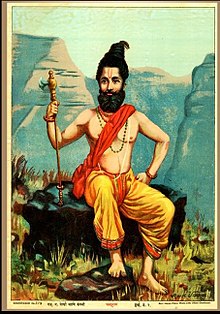
Back برشرام Arabic পৰশুৰাম Assamese Parashurama BCL পরশুরাম Bengali/Bangla Parashurama Breton Parashurama Catalan Parashurama German Παρασουράμα Greek Parashurama Spanish پارسهوراما Persian
| Parashurama | |
|---|---|
| Member of Dashavatara and Chiranjivi | |
 Parashurama by Raja Ravi Varma | |
| Other names |
|
| Devanagari | परशुराम |
| Sanskrit transliteration | Paraśurāma |
| Affiliation | Vaishnavism |
| Abode | Mahendra Mountains |
| Weapon | Parashu (Parashu) |
| Day | Thursday |
| Genealogy | |
| Born | Akshaya Tritiya |
| Parents | |
| Siblings | Ṛumaṇvān, Suhotra, Vasu, and Viśvāvasu[2] |
| Spouse | Dharani (Lakshmi)[1] |
| Dashavatara Sequence | |
|---|---|
| Predecessor | Vamana |
| Successor | Rama |
Parashurama (Sanskrit: परशुराम, romanized: Paraśurāma, lit. 'Rama with an axe'), also referred to as Rama Jamadagnya, Rama Bhargava and Virarama,[3] is the sixth avatar among the Dashavatara of the preserver god Vishnu in Hinduism.[4] Hindu tradition holds him to be the destroyer of the evil on Earth. According to legends, Shiva advised him to go and liberate the Mother Earth from felons, ill-behaved men, extremists, demons and those blind with pride. He is described as one amongst the Chiranjivis (Immortals), who will appear at the end of the Kali Yuga to be the guru of Vishnu's tenth and last incarnation, Kalki.
Born to Jamadagni and Renuka, the Brahmin Parashurama was foretold to appear at a time when overwhelming evil prevailed on the earth. The Kshatriya class, with weapons and power, had begun to abuse their power, take what belonged to others by force and tyrannise people. He corrected the cosmic equilibrium by destroying these Kshatriyas twenty-one times (leaving some lineages). He is married to Dharani, an incarnation of Lakshmi, the wife of Vishnu.[5]
In the epic Ramayana, he arrives after Sita Swayamvara, upon hearing the loud noise when Rama uplifts and breaks the divine bow Pinaka. He later deduces that Rama is Vishnu himself, he himself asked Rama to destroy the fruits of his austerities.
In the epic Mahabharata he was the guru of Bhisma, Drona, Rukmi and Karna.[6][7]
Parshuram is said to carry various traits including courage, aggression, and warfare along with serenity, patience and prudence. He was known to show his benevolence to Brahmins, children, women, old men and other weaker sections of the society.
- ^ Debroy, Bibek (30 June 2022). Vishnu Purana - Bibek Debroy - Google Books. Penguin Random House India Private Limited. ISBN 9789354926617. Retrieved 25 September 2022.
- ^ "Story of Jamadagni". 28 January 2019.
- ^ Cite error: The named reference
Leslie2014p66was invoked but never defined (see the help page). - ^ Chakraborty, Yogabrata (28 June 2023). "পুরীধাম ও জগন্নাথদেবের ব্রহ্মরূপ বৃত্তান্ত" [Puridham and the tale of lord Jagannath's legendary 'Bramharup']. dainikstatesmannews.com (in Bengali). Kolkata: Dainik Statesman (The Statesman Group). p. 4. Archived from the original on 28 June 2023. Retrieved 28 June 2023.
- ^ Coulter, Charles Russell; Turner, Patricia (4 July 2013). Encyclopedia of Ancient Deities. Routledge. ISBN 978-1-135-96390-3.
- ^ Constance Jones; James D. Ryan (2006). Encyclopedia of Hinduism. Infobase Publishing. p. 324. ISBN 978-0-8160-7564-5.
- ^ James G. Lochtefeld (2002). The Illustrated Encyclopedia of Hinduism: N–Z. The Rosen Publishing Group. pp. 500–501. ISBN 978-0-8239-3180-4.